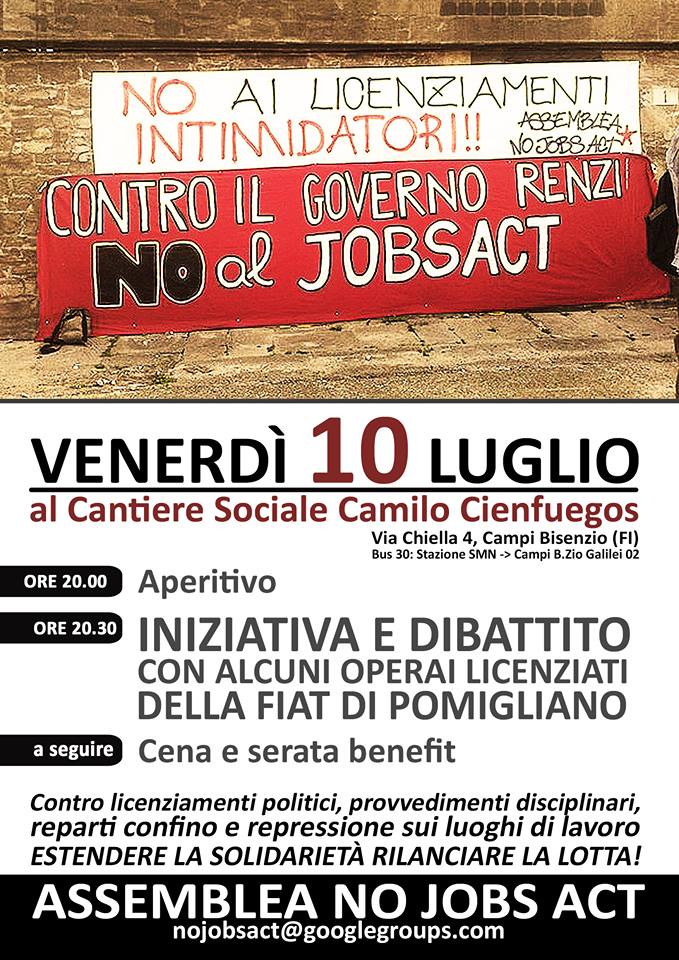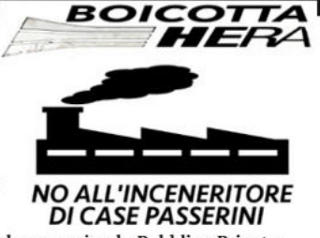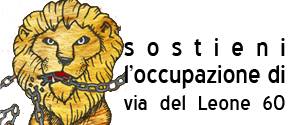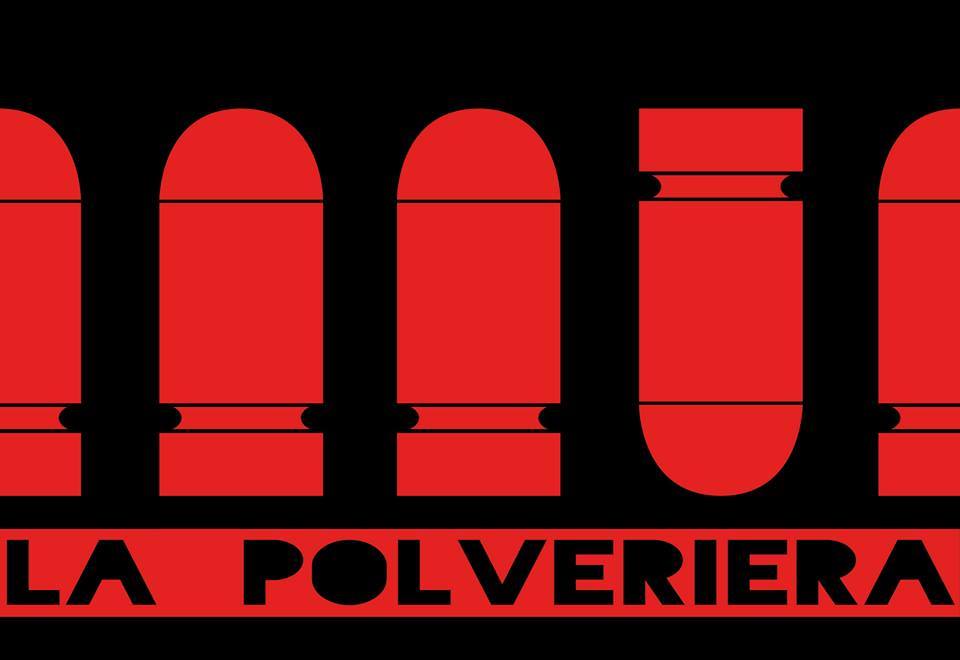Marxism(s) in Social Movements. Is Marx Back in Social Theory?
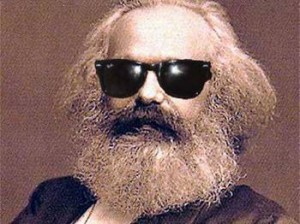 A partire dal prossimo mercoledì (8 ottobre) si apre un interessante e ricco programma di appuntamenti all’Istituto Universitario Europeo di Fiesole, centrati su quella Marx Renaissance ormai sempre più diffusa in molti settori disciplinari diversi. Invitiamo tutti gli interessati a mettersi in contatto con gli organizzatori e a partecipare a questa serie di incontri. Il primo appuntamento si svolgerà, come già anticipato, mercoledì 8 ottobre dalle ore 17,00 alle 19,00 presso Seminar Room 2 della Badia Fiesolana, via Roccettini 9, San Domenico di Fiesole (FI).
A partire dal prossimo mercoledì (8 ottobre) si apre un interessante e ricco programma di appuntamenti all’Istituto Universitario Europeo di Fiesole, centrati su quella Marx Renaissance ormai sempre più diffusa in molti settori disciplinari diversi. Invitiamo tutti gli interessati a mettersi in contatto con gli organizzatori e a partecipare a questa serie di incontri. Il primo appuntamento si svolgerà, come già anticipato, mercoledì 8 ottobre dalle ore 17,00 alle 19,00 presso Seminar Room 2 della Badia Fiesolana, via Roccettini 9, San Domenico di Fiesole (FI).
Per info: http://marxismsinsocialmovements.wordpress.com/
Abstract: Recent years have seen an enormous increase in protests across the world in which citizens have challenged what they see as a deterioration of democratic institutions and the very civil, political and social rights that form the basis of democratic life. Beginning with Iceland in 2008, and then forcefully in Egypt, Tunisia, Spain, Greece and Portugal, or more recently in Peru, Brazil, Russia, Bulgaria, Turkey and Ukraine, people have taken to the streets against what they perceive as a rampant and dangerous corruption of democracy, with a distinct focus on inequality and suffering. Donatella della Porta addresses the anti-austerity social movements of which these protests form part, mobilizing in the context of a crisis of neoliberalism. She shows that, in order to understand their main facets in terms of social basis, strategy, and identity and organizational structures, we should look at the specific characteristics of the socioeconomic, cultural and political context in which they developed
Why (Re)launching the EUI Social Movement Working Group?
Academic working groups are powerful scholarly tools where junior and senior students can present their empirical works, discuss theories and concepts, and exchange innovative ideas in a friendly and scientific stimulating environment. Their proliferation and recognition within academia help overcome the rigid disciplinary distinctions of sciences, facilitating a fruitful scientific cooperation among scholars from different ideological schools of thought. Working groups seem to be even more important today, in the so called knowledge society, to the extent that their proliferation can contribute to breaking down the ivory tower of academia, facilitating the socialization and dissemination of critical knowledge. Working group can, thus, be seen as the cornerstone of knowledge production in contemporary society. It is precisely with this spirit that we aim at (re)launching the EUI Social Movement Working Group for the academic year 2014/2015 by organizing a new seminar series on the theme of “the return of Marx” in contemporary sociology, and especially in social movement studies. Doing so, we think to resume at best the tradition of scientific cooperation, theoretical challenges, and exchange of ideas characterizing the past editions of the Social Movement Working Group within the EUI academic community. Writing a PhD thesis is not a solipsistic intellectual effort produced by an individual mind, but rather needs to be constantly fuelled by the presence of a stimulating academic community. We think that the relaunch of the Social Movement Working Group represents a small yet indispensable step for the construction of that community.
… What are we going to talk about?
There is a widespread agreement among a certain number of movement scholars on the fact that the recent wave of protests has put into crisis the dominant theories of social movements. Some of their analytical and conceptual tools seem no longer to be effective in explaining the factors triggering mobilization. How to better understand the outburst of current mobilizations? How to explain their framing processes, repertoires of action, goals, and outcomes? We think that bringing back political economy in the study of social movements is a first and necessary step to be undertaken to answer these questions. This view is also shared by some of the most recent strands of social movement research, aiming at (re)taking seriously economist perspectives, and especially Marxist, in the study of contemporary mobilizations. By calling for a (re)turn to Marxist and other political economist perspectives in social movement research we would like to underline the importance of bringing “capitalism” back in—as Hetland and Goodwin (2013) have stressed in a recently published article—even in the analyses of the “new” and “apparently” post-materialist movements of the last three decades. Contemporary society and its structural and cultural changes need to be (re)investigated through new conceptual and analytical lens embodying more critical perspectives. The themes and approaches that we will present and debate over the ten planned sessions go precisely in this direction. In particular, we look at different interpretations of Marx which have today heavily influenced some strands of various disciplines, ranging from political economy to sociology and political theory, to discuss whether and to what extent they may offer useful insights to understand the current capitalist transformations. To this end, we will bring together and discuss with leading figures in the fields of social movement studies, political economy, economic sociology, and political theory. In the 2014/2015 academic year, the Social Movement Working Group aims to starting a debate on the possibility to create a common analytical language, drawing selectively from distinct epistemological approaches, capable of critically investigating the contemporary capitalist reality in all its facets. To do so, we need to challenge the established division of labor characterizing mainstream social sciences both in their epistemological and empirical respects. From an epistemological point of view, we aim to overcoming the disciplinary boundaries of social sciences by combining approaches and concepts of various disciplines in order to build up a shared theoretical framework through which to critically analyze society. From an empirical point of view, we aim to overcoming the established thematic boundaries of social sciences that have prevented scholars from having a broader comprehension of capitalist society and its transformations by merging and bringing together topics and objects of study that are usually confined in (over)specialized scientific fields. As key example of this disciplinary overspecialization, one can think of the neat distinction made by the American sociology between social movement and labor studies. The former are strictly focused on the study of “new” social movements, whereas the latter investigate unions and labor organizations(are we sure that such a sharp epistemological division of social science reflects an ontological division of social reality?). The most important lesson that we can learn from Marx is precisely his ability to explore social reality through a holistic perspective, as it is only by building a broader framework of analysis that is possible to fully investigate capitalism and its changes. The underlying question that will accompany all the sessions and will conclude our seminar with the final roundtable is thus: can Marx get back in social movement studies?
How to join the working group?
Working group is open to all researchers and professors within EUI. If you wish to participate in this working group or receive information about forthcoming sessions just write an email to the organizers of the working group: Lorenzo Cini (lorenzo.cini@eui.eu), Daniela Chironi (Daniela.chironi@eui.eu) and Eliska Drapalova (Eliska.drapalova@eui.eu), Federico Tomasello (fedetom@gmail.com).
***
THE PROGRAMME
The working group will meet approximately on monthly bases. In each session a professor or researcher will present his work that is fitting into the session thematic with one complementary reading in order to deepen the debate. Researchers act as discussants. After each session we will head together to have a pizza or aperitivo to follow our discussion in a more informal manner.
Session 1 (08/10/2014): Bringing Capitalism Back In. Social Movements in Times of Austerity, Seminar Room 2, Badia
Speaker: Prof. Donatella della Porta (Director of Cosmos, Robert Schuman Center for Advanced Studies and Scuola Normale Superiore) – Reading Material
Discussants: Federico Tomasello, Alice Mattoni
Session 2 (28/10/2014): Creditocracy and the Case for Debt Refusal, Seminar Room 4, Badia
Speakers: Prof. Andrew Ross (New York University) – Reading Material
Discussants:
Session 3 (12/11/2014): Making a Case for a Marxist Revival in Social Movement Studies, Seminar Room 2, Badia
Speaker: Prof. Colin Barker (Metropolitan University of Manchester) – Reading Material
Discussants:
Session 4 (17/12/2014 ): Critical Theory and Marxism: Yesterday and Today?, Seminar Room 2, Badia
Speaker: Prof. Claus Offe (Hertie school of governance) – Reading Material
Discussants:
Session 5 ( 29/01/2015): Class Struggle in the Italian Critical Marxism. Situating an Anticapitalist Perspective of Social Movements in Theory and Practice
Speaker: Prof. Antonio Negri (independent) – Reading Material
Discussants:
Session 6 (February 2015): Italian Critical Marxism at Work: Movement(s) of the Migrant Labour across and within the Borders
Speaker: Prof. Sandro Mezzadra (Università di Bologna) – Reading Material
Discussants:
Session 7 (March 2015): Marxist Political Economy and Social Movements: Bridging a Theoretical (and Political) Gap
Speaker: Prof. Emiliano Brancaccio (Università del Sannio) – Reading Material
Discussants:
Session 8 (April 2015): Theory and practice of the Unionisation of the self employed in Europe and in the U.S.
Speaker: Prof. Sergio Bologna (independent) – Reading Material
Discussants:
Session 9 (April 2015): On the Feminisation of Labour: Feminist Theories and Practices of Resistance
Speakers: Prof. Brunella Casalini (Università di Firenze) – Reading Material
Discussants:
Session 10 (May 2015): Why Social Movements Need Marxist Theory
Speaker: Prof. Jeff Goodwin (New York University) – Reading Material
Discussants:
Session 11 (May 2015): Taking Crisis Seriously: Capitalism on its Way Out
Speaker: Prof. Wolfang Streeck (Max Plank Institute) – Reading Material
Discussants:
Final Roundtable (June 2015): Why Marxism(s) Should Speak to Social Movement Studies and Vice Versa
Discussion with: Donatella della Porta, Alice Mattoni, Lorenzo Cini and Federico Tomasello
Moderators: Daniela Chironi
Leggi anche:










